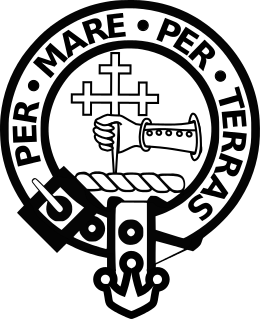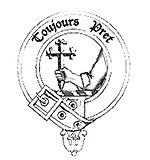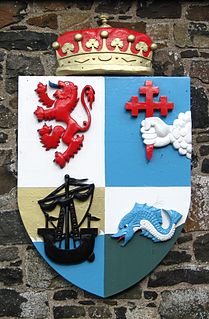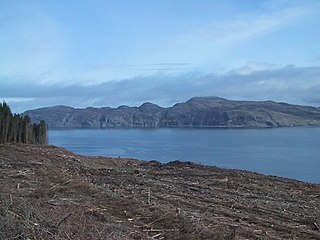Related Research Articles

The Lord of the Isles or King of the Isles (Scottish Gaelic: Triath nan Eilean or Rìgh Innse Gall) is a title of Scottish nobility with historical roots that go back beyond the Kingdom of Scotland. It began with Somerled in the 12th century and thereafter the title was held by a series of his descendants, the Norse Gaels rulers of the Isle of Man and Argyll and the islands of Scotland in the Middle Ages. They wielded sea-power with fleets of galleys (birlinns). Although they were, at times, nominal vassals of the Kings of Norway, Ireland, or Scotland, the island chiefs remained functionally independent for many centuries. Their territory included much of Argyll, the Isles of Arran, Bute, Islay, the Isle of Man, Hebrides, Knoydart, Ardnamurchan, and the Kintyre peninsula. At their height they were the greatest landowners and most powerful lords after the Kings of England and Scotland.

Clan Donald, also known as Clan MacDonald, is a Highland Scottish clan and one of the largest Scottish clans. The Lord Lyon King of Arms, who is the Scottish official with responsibility for regulating heraldry in that country, issuing new grants of coats of arms, and serving as the judge of the Court of the Lord Lyon, recognizes under Scottish law the High Chief of Clan Donald. Historically the chiefs of the Clan Donald held the title of Lord of the Isles until 1493 and two of those chiefs also held the title of Earl of Ross until 1476.

Clan MacDonald of Clanranald, also known as Clan Ranald or Clan Ronald, is a Highland Scottish clan and a branch of Clan Donald, one of the largest Scottish clans. The founder of the MacDonalds of Clanranald is Reginald, 4th great-grandson of Somerled. The MacDonalds of Clanranald descend from Reginald's elder son Allan and the MacDonells of Glengarry descend from his younger son Donald. The clan chief of the MacDonalds of Clanranald is traditionally designated as The Captain of Clanranald and today both the chief and clan are recognised by the Lord Lyon King of Arms, the heraldic judge in Scotland.

Clan Macdonald of Sleat, sometimes known as Clan Donald North and in Gaelic Clann Ùisdein[kʰl̪ˠan̪ˠ ˈuːʃtʲɛɲ], is a Scottish clan and a branch of Clan Donald — one of the largest Scottish clans. The founder of the Macdonalds of Sleat was Ùisdean, or Hugh, a 6th great-grandson of Somerled, a 12th-century Lord of the Isles. The clan is known in Gaelic as Clann Ùisdein, and its chief's Gaelic designation is Mac Ùisdein, in reference to the clan's founder. Both the clan and its clan chief are recognised by the Lord Lyon King of Arms, who is the heraldic authority in Scotland.

Clan MacDonald of Dunnyveg, also known as Clan Donald South, Clan Iain Mor, Clan MacDonald of Islay and Kintyre, MacDonalds of the Glens (Antrim) and sometimes referred to as MacDonnells, is a Scottish clan and a branch of Clan Donald. The founder of the MacDonalds of Dunnyveg is Eòin Mòr Tànaiste Mac Dhòmhnaill, a son of Iain Mic Dhòmhnaill and Margaret Stewart of Scotland, daughter of King Robert II. Members of the clan actually pronounced and spelled their name M'Connall due to the Gaelic pronunciation of the name Mac Domhnuill thus giving rise to the surname McConnell and its variants. While historically recognised as a clan by the Court of the Lord Lyon, it is now an armigerous clan as it no longer has a chief. The last chief was Sir James MacDonald, 9th of the Clan MacDonald of Dunnyveg or Clan Donald South, who died in London in 1626.

Clan MacAlister is a Scottish Clan and a branch of Clan Donald. The clan is the earliest branch to have split off from Clan Donald, claiming descent from Alasdair Mòr, son of Domhnall founder of Clan Donald. From Alasdair Mòr the clans takes its surname MacAlister; this surname is an Anglicisation of the Gaelic MacAlasdair meaning "son of Alasdair". In the 15th century the chief of the clan was seated in Kintyre, and the clan was centred there until the 18th century, when a chief sold the family estate in preference to an estate in the Scottish Lowlands.

Alexander of Islay or Alexander MacDonald was a medieval Scottish nobleman, who succeeded his father Domhnall of Islay as Lord of the Isles (1423–1449) and rose to the rank of Earl of Ross (1437–49). His lively career, especially before he attained the earldom of Ross, led Hugh MacDonald, the 17th century author of History of the MacDonalds, to commemorate him as "a man born to much trouble all his lifetime". Alexander allied himself with King James I of Scotland against the power of the Albany Stewarts in 1425 but, once the Albany Stewarts were out of the way, Alexander quickly found himself at odds with the new king. War with King James would initially prove Alexander's undoing, and would see the King's power in Scotland greatly increased, but at the Battle of Inverlochy Alexander's army prevailed against the forces of the King. Alexander died in 1449, having greatly extended his family's landed wealth and power. He was buried, not in the Isles of his ancestors, but at Fortrose Cathedral in his mainland Earldom of Ross.
Domhnall Dubh was a Scottish nobleman. He was the son of Aonghas Óg, chief of Clan Donald, and claimant to the Lordship of the Isles, which had been held by his grandfather John of Islay, Earl of Ross. While just an infant, Domhnall Dubh was captured by Cailean I, Earl of Argyll and imprisoned in Innischonnel Castle in Loch Awe. He remained in captivity for most of his life. He died at Drogheda, Ireland, in 1545.

The MacDonnells of Antrim, also known as the MacDonnells of the Glens, are a branch in Ireland of the primarily Scottish-based Clan Donald. Initially part of Clan MacDonald of Dunnyveg, the MacDonnells of Antrim became their own branch in 1558 when Somhairle Buidhe MacDonnell obtained the lordship of the territory in Ireland from James MacDonald, 6th chief of the Clan MacDonald of Dunnyveg. The MacDonnells of Antrim were a sept of the powerful Clan Donald of the royal Clann Somhairle,, that the English crown had attempted to cultivate since the early 14th century in its efforts to influence the course of politics in Scotland. The MacDonnells established a growing presence in Ireland throughout the 15th and 16th centuries,and played a crucial role in the politics of 17th century Ireland. The MacDonnell's achieved much success in Ireland largely to cultural and familial connections to the Gaelic nobility of Ireland. Today the surname is predominantly spelled McDonnell in Ireland and abroad, although many McConnell's are also of the same family, as that is the Gaelic pronunciation of the Mac Domhnaill. Most of the leadership of the Clan wrote their name as a variant of McConnell up until the 17th Century, including Sorley Boy MacDonnell himself. Many of the present-day McDonnell's have a common descent from Sorley Boy MacDonnell.

Sìleas na Ceapaich was a Scottish poet. She lived between c.1660 and 1729.
Coll Ciotach Mac Domhnaill (1570–1647) was a Scottish adventurer and mercenary of the Clan MacDonald of Dunnyveg branch of Clan Donald, who became Laird of Colonsay in 1623, by treachery. His name, which means "Coll the left-handed" or "the crafty", was anglicised as Colkitto. However he only used the nickname Ciotach late in his life in 1629 when it appeared in a Latin translation of a Gaelic letter where Coll refers to himself as "Ego Collatius Kiotach Macdonnell".

The Battle of Bloody Bay, or Blàr Bàgh na Fala in Scottish Gaelic, was a naval battle fought near Tobermory, Scotland. It was fought on the coast of Mull 2 miles north of Tobermory, between John MacDonald of Islay, the Lord of the Isles and chief of Clan Donald; and his son, Angus Og Macdonald. The precise date of the battle varies in sources, from 1480 to 1483. After the battle, in which Angus Og Macdonald emerged victorious, the latter seized power from his father, and held it for the rest of the decade. However, Angus's victory would prove pyrrhic. Many clansmen had died in the battle and nearly half the clan's fleet had been sunk, as a result of which the power of the Lords of the Isles was henceforth greatly diminished. Angus, last of the independent Lords of the Isles, would himself be murdered in 1490.

The Battle of Traigh Ghruinneart or in Scottish Gaelic Blàr Tràigh Ghruineart or sometimes called the Battle of Gruinart Strand was a Scottish clan battle fought on 5 August 1598, on the Isle of Islay, in the Hebrides. It was fought between the Clan Donald and Clan Maclean. A tràigh or stand is the flat area of land bordering a body of water, a beach, or shoreline.
Malcolm Maclean or Maolcaluim mac Giliosa in Scottish Gaelic, was the 3rd Chief of Clan Maclean. Malcolm's name has been written Maol-Calum and Gille-Calum, which means Servant of Columba. He became the Chief of Clan Maclean on the death of his father in 1300. He was succeeded by John Dubh Maclean, 4th Clan Chief, his youngest son. Though the eldest son inherited in many clans by then (including Robert Bruce, the eldest of four sons of Robert Bruce VI. who became King of Scots, and Alexander Og Macdonald, his father's eldest son who became Lord of the Isles on the death of Angus Mor Macdonald, it was a time of transition concerning the law of primogeniture. He died around 1320.
Lachlan Lùbanach Maclean, 5th Chief was Chief of Clan Maclean. He was the first Maclean to occupy Castle Duart as the 1st Laird of Duart. His brother, Hector Reaganach Maclean was the progenitor of the Lochbuie Macleans usually MacLaines.
Alasdair Mór mac Domhnaill was a younger son of Domhnall mac Raghnaill—the eponymous ancestor of Clan Donald. He first appears on record in 1253, when it is recorded as witnessing a charter by his brother, Aonghus Mór, to Paisley Abbey. According to the 19th century Clan Donald historians Angus and Archibald Macdonald, Alasdair Mór must have been a prominent man as he is the only recorded brother of Aonghus Mór. He is recorded in the Annals of Connacht, in the year 1299, as being a man noted for being a "generous and bounteous man". In that year he was slain in a conflict with Alasdair of Argyll and the MacDougalls. He is said to have had at least five sons: Dòmhnall, Gòraidh, Donnchadh, Eoin and Eachann. Alasdair Mòr was succeeded in the representation of his clan by Dòmhnall. Today he is considered to be the eponymous ancestor of Clan MacAlister.
Owen MacEoin Dubh MacAlister was a son of Alasdair MacEoin Dubh MacAlister, 1st of Loup, Chief of Clan MacAlister. He was killed in battle in Antrim, Ireland in 1571.
William Dubh MacLeod is considered to be the 7th Chief of Clan MacLeod. He is thought to have been a younger son, yet because of the death of his elder brother, William Dubh succeeded his father, Iain Borb, in the year 1442. William Dubh was an old man when he was killed, leading his clan, at the Battle of Bloody Bay in 1480. He was the last MacLeod chief to be buried on the island of Iona. He was succeeded by his son, Alasdair Crotach.

Alasdair Crotach MacLeod is considered to be the 8th Chief of Clan MacLeod. He was the son of the 7th Chief of Clan MacLeod, William Dubh, and succeeded his father in 1480, following William Dubh's death at the Battle of Bloody Bay. He was the first MacLeod chief not to be buried on the island of Iona.
Mulindry House, also known as Caisteal Mhic Dhomhnuill or Mullintrae House, was a fortified house north of Mulindry Farm, Islay, Scotland.
References
- Macdonald, Angus; Macdonald, Archibald (1900). The Clan Donald. Vol. 3. Inverness: The Northern Counties Publishing Company, Ltd. pp. 184–189.